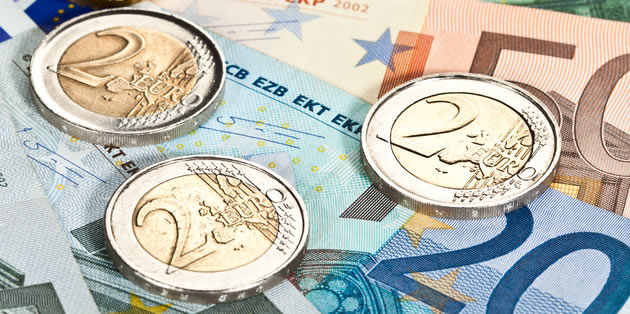- Higher UK consumer confidence boosted Pound – GBP/EUR exchange rate strengthened ahead of weekend
- Fed hike bets weighed on Euro sentiment – Single currency declined on worries over central bank policy divergence
- Stronger German inflation fails boost Euro – Although higher inflationary pressure could stave off further ECB easing
- ‘Brexit’ uncertainty to continue – Pound Sterling expected to remain volatile
Pound Slips Vs. Euro, German Unemployment Falls
As the European session progressed the Pound lost ground against its European counterpart following the publication of upbeat German employment figures.
Although the number of unemployed persons increased unexpectedly, the unemployment rate fell to 6.1%.
The Eurozone’s inflation report also showed that annual non-core consumer price pressures improved from -0.2% to -0.1%.
These latest figures gave the common currency a boost and the Pound Sterling to Euro (GBP/EUR) exchange rate was left trending in the region of 1.3110.
Whether or not the Pound falls further as the week progresses largely depends on the UK’s Manufacturing, Construction and Services PMIs.
Signs of slowing output would weigh on Sterling but any recovery in the manufacturing sector would be well received.
As it stands, economists have forecast that the gauge will increase slightly from 49.2 to 49.6 but remain below the 50 mark separating growth from contraction.
(Previously updated 09:30 31/05/2016)
GBP/EUR Hold 1.31 Despite German Inflation
The Pound Sterling to Euro (GBP/EUR) exchange rate was able to advance slightly on the Euro as markets reopened following the UK Bank Holiday despite Germany’s latest inflation figures showing an uptick in consumer price pressures.
As forecast, German inflation increased 0.3% on the month, taking CPI to 0.1% on the year.
With the Eurozone’s inflation figures due for release later today, further GBP/EUR movement can be expected but as it stands the pairing is trending in the region of 1.3134
This morning’s Lloyds Business Barometer printed at 32, down from 38, but the report had little impact on demand for Sterling.
(Previously updated 07:30 30/05/2016)
Improved UK Consumer Confidence Increased Demand for Pound Sterling (GBP)
Although the Pound’s (GBP) earlier bullish run was brought to an end by the downward revision of the UK’s first quarter GDP this weakness did not ultimately last for long. Investors were prompted to buy back into Sterling on Friday morning after the GfK Consumer Confidence Survey bettered expectations. Forecasts had pointed towards a fresh weakening in domestic sentiment, leading to an increase in optimism after the index instead rose from -3 to -1. This stronger showing would seem to imply that referendum uncertainty has not been weighing on minds so much in May, raising the prospect of similar improvement in other measures of consumer sentiment.
Confidence in the Euro (EUR), meanwhile, was weakened ahead of the weekend by the strength of the US Dollar (USD), which was shored up by increased bets of imminent Fed tightening. While French consumer confidence unexpectedly rose to its highest level since October 2007 this was not enough to bolster the single currency.
Stronger German Inflation Predicted to Shore up Euro (EUR) Demand
Greece remains a prominent downside influence on the common currency, in spite of last week’s seemingly positive Eurogroup meeting. While the next tranche of bailout funds were unlocked there remains strong discontent within the Hellenic nation, with markets still concerned by the slim parliamentary majority held by Prime Minister Alexis Tsipras and its possible ramifications on further austerity measures. As the International Monetary Fund (IMF) has suggested that its concerns over the postponement of debt relief measures still stand doubts have arisen over the continued involvement of the Fund. The loss of IMF backing would be a severe blow for the bailout, a prospect that is likely to continue weighing on the appeal of the Euro.
Later today the single currency could make some strong gains on the back of the latest German Consumer Price Index data, however. Expectations are for a modest uptick in domestic inflationary pressure from -0.1% to 0.1% on the year. Given persistent worries over inflation within the Eurozone, and the growing possibility of further European Central Bank (ECB) intervention, a stronger showing here is likely to encourage investors to favour the Euro once again.
GBP/EUR Exchange Rate Forecast to Weaken on Continued ‘Brexit’ Uncertainty
Pound Sterling sentiment is likely to remain tied to ‘Brexit’ speculation for the foreseeable future, particularly given a general lack of UK ecostats in the early week. While recent polls and warnings from the Bank of England (BoE) and Institute for Fiscal Studies (IFS) had prompted a strong surge in optimism the mood could remain more muted in coming days. The result of the vote remains far from clear at this juncture, especially given the disparity between telephone and online polls, so as Dr Jörg Krämer, Chief Economist at Commerzbank notes:
‘The uncertainty should persist up to the referendum. Our baseline scenario is that the UK will remain in the EU. GBP exchange rates should then recover.’
Confidence in the outlook of the UK economy could suffer further if the latest raft of domestic PMIs prove discouraging later in the week. Weaker domestic activity is likely to increase worries that there is a greater underlying slowdown affecting the economy, rather than merely referendum uncertainty. Softer figures would also be seen to lower the chances of the Bank of England (BoE) raising interests for some months to come, even in the event of a vote to remain in the EU.
The UK’s Markit Manufacturing, Construction and Services PMI are all scheduled for release later in the week.



